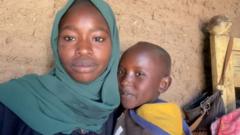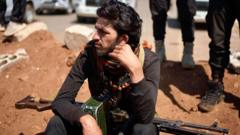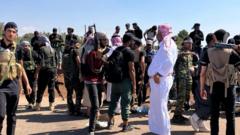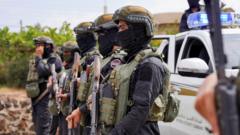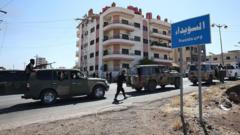A devastating suicide bombing at a Greek Orthodox service in Damascus, leaving at least 20 dead, highlights the sectarian challenges faced by Syria's newly established government after years of civil war.**
Tragic Suicide Bombing Strikes Damascus Church, Revealing Ongoing Sectarian Tensions**

Tragic Suicide Bombing Strikes Damascus Church, Revealing Ongoing Sectarian Tensions**
Attack at Mar Elias Church raises concerns for Syria’s new leadership amidst lingering violence.**
In a harrowing reminder of Syria's turbulent past, a suicide bombing targeted a Greek Orthodox service in Damascus on Sunday, resulting in at least 20 fatalities and over 50 injuries. The attack, which occurred at Mar Elias Church in the Dweila neighborhood, signifies the daunting challenges confronting the country's new administration in the wake of a decade-long civil conflict.
According to Syrian authorities, the assailant opened fire on the church congregation before detonating an explosive vest, marking the first suicide bombing in the capital since the ousting of long-time president Bashar al-Assad in December. Allegedly linked to the Islamic State, the violent act underscores the potential resurgence of extremist groups amid the power vacuum left by the previous regime.
The emerging government has been vocal about restoring stability while aiming to reassure vulnerable religious minorities. However, sectarian tensions remain high, with warnings from U.N. and U.S. officials about the attempts of Islamic State remnants to exploit this precarious situation. Humanitarian responders and locals rushed to the scene, where eyewitness reports described horrific carnage, with state media showcasing visuals of damaged church interiors.
As the Syrian government continues to navigate the aftermath of this tragedy, the ongoing violence raises critical questions about its ability to maintain peace and unity among the nation's diverse communities, still healing from the scars of the civil war.
According to Syrian authorities, the assailant opened fire on the church congregation before detonating an explosive vest, marking the first suicide bombing in the capital since the ousting of long-time president Bashar al-Assad in December. Allegedly linked to the Islamic State, the violent act underscores the potential resurgence of extremist groups amid the power vacuum left by the previous regime.
The emerging government has been vocal about restoring stability while aiming to reassure vulnerable religious minorities. However, sectarian tensions remain high, with warnings from U.N. and U.S. officials about the attempts of Islamic State remnants to exploit this precarious situation. Humanitarian responders and locals rushed to the scene, where eyewitness reports described horrific carnage, with state media showcasing visuals of damaged church interiors.
As the Syrian government continues to navigate the aftermath of this tragedy, the ongoing violence raises critical questions about its ability to maintain peace and unity among the nation's diverse communities, still healing from the scars of the civil war.




